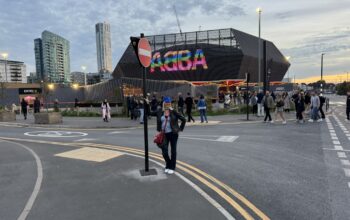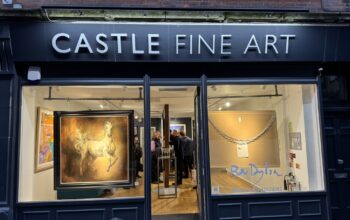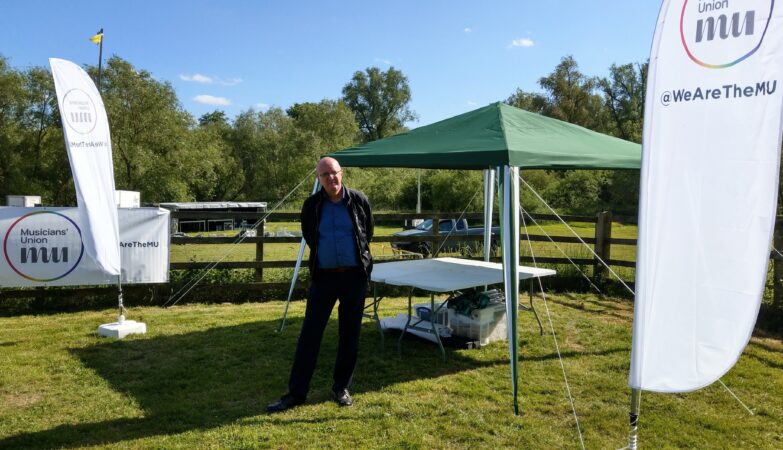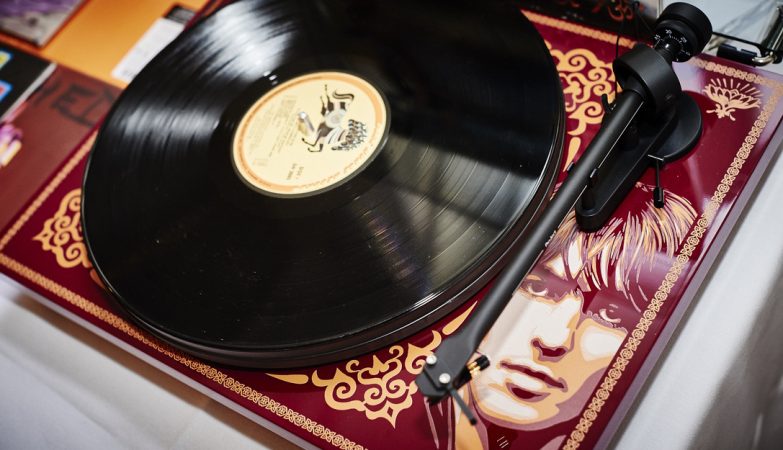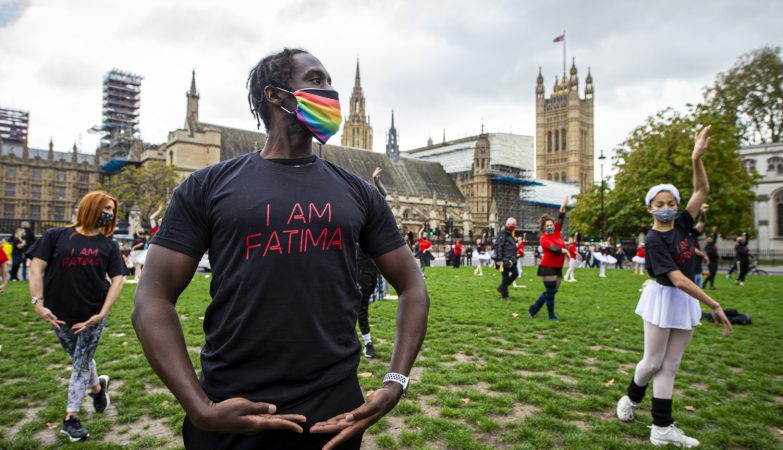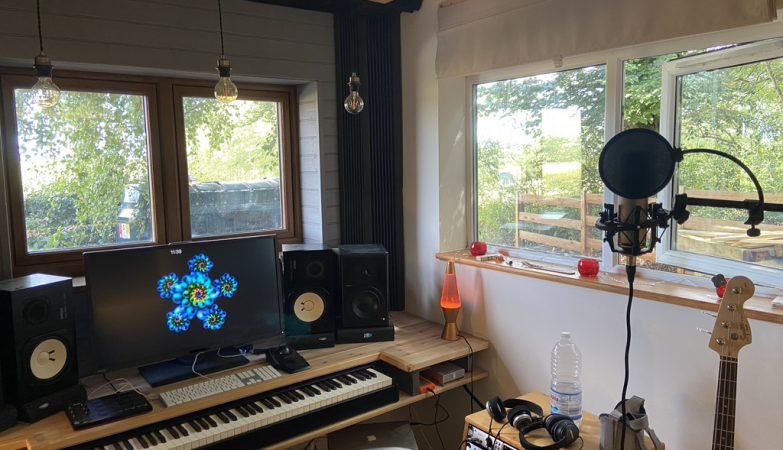I was blessed with the opportunity to visit the Kensal Green home today of renowned cellist Anita Lasker-Wallfisch and to interview her for a feature in The Musician. Anita is an amazing woman, set to turn 90 in July. I learnt of her experiences in Germany before World War II, her time in the Auschwitz Women’s Orchestra and of her surviving the horrors of Belsen-Bergen. Upon coming to England in 1946, she met local musicians and co-founded what was to become the English Chamber Orchestra. The interview was recorded and I have been able to transcribe her fascinating story into a feature for The Musician magazine.
Transcription of the interview:
“My mother was a violinist. We were all encouraged to learn an instrument, it was a normal way of life.
In the Nazi time, more and more people who could emigrate, did so. With the result that there wasn’t a cello teacher in the town where I lived – Breslau. Or one who would teach me. An Aryan once came to my house and I had to play for him and he said ‘I daren’t do it.’ That was the atmosphere then.
There was the possibility to send me to Berlin, where there was the brother of Marz Rostaul, who was a very fine cellist. He heard me play and said ‘send her to Berlin.’ That was in 1938.
All you felt was fear of what was going to happen the next day. You didn’t think so much of being a musician. What’s going on? That was Berlin in 1938.
Then came the famous 9 November, the Kristallnacht, with the result that my teacher emigrated to America and my parents wanted me to come home straightaway as we didn’t know what was going to happen. That was really the end of my cello playing activities – although we played chamber music at home.
After the 9 November there was a tremendous attempt by my parents to try and emigrate somewhere, which proved completely impossible. Everybody tried to emigrate and the frontiers closed. We didn’t succeed, war broke out and we were trapped.
The deportation of the Jews started, in earnest in 1942. My parents were deported and my sister and I were conscripted to slave labour, going to a factory to produce toilet paper – there was no more cello playing. That was very tertiary.
We worked in the paper factory and as we were brought up speaking French – we were quite belligerent youngsters, my sister and I – there were French prisoners of war in the factory and we somehow started talking to each other, very secretly, and they finally asked whether we could help in any way, which we did and we started to help them forge papers and bring civilian clothes etc. A whole clandestine activity went on ‘backstage’ which was finally discovered and it was obvious that we couldn’t carry on. So, like very naive teenagers, we thought we could try and escape. So we forged papers for ourselves, French papers of civilian workers who were allowed occasionally to go on leave. We were obviously being observed for a long time. We got as far as the railway station, we were arrested and put in prison.
I spent a whole year of prison. The ridiculous thing about the German system was that it had a positive result for us. We were arrested, not so much as Jews, but as criminals who had forged papers etc. It was a good thing, as it allowed us to stay in prison and have a court case. The whole thing is ludicrously stupid but it was very fortuitous for us. So suddenly the Jewish part was secondary, the criminal part was the important thing. We stayed in prison for over a year and waited for a court case. We were sentenced for forgery, attempted escape and helping the enemy. And we got a sentence which we were very pleased about, because we already knew what was going on in the concentration camps. We thought good, we can stay in prison. Prison was not very agreeable, I can assure you, but it was better than the camps.
We had the court case, we were sentenced, however prisons were so overcrowded. You have to understand the German system. There was the Gestapo and there was a sort of legal system, and they didn’t get on terribly well with each other. As soon as we were sentenced by the court, the Gestapo grabbed us again and we were sent to Auschwitz. When I arrived, this ridiculous situation arose, the girl who tattooed me and shaved my hair and took my clothes off me, talked to me (they were all prisoners who did that) and said ‘where did you come from and what did you do before the war? Said like an idiot, ‘I used to play the cello.’ That was my saving sentence. There is an orchestra here and they need a cello. And that was how I landed up in that famous women’s orchestra in Auschwitz.
She said, ‘Wait here, this is fantastic.’ She went and got the conductor to come and meet this naked girl without hair and a number on her arm. That woman was Alma Rose. She was a niece of Gustav Mahler and that daughter of Arna Rose, who had been leading the Vienna Opera for years. She said, ‘We have just formed this orchestra and we have got this bass instrument.’
Every camp had an orchestra, which I only learned about after the war. We were different because we were complete amateurs. We were young kids, some learned the guitar, some the mandolin, some were very good violinists, but I would say it was only ten per cent of people who could actually play properly. The rest was up to Alma to make us into an orchestra, because it was a thread of hope you might survive. As long as they need you for something, they won’t kill you. A very simple logic.
I was in Auschwitz for about a year, but everything came to an end as the Russians approached. We are now in 1944. And it was obvious the interest in the orchestra was waning, and Alma had died. We knew things were not going well,for the Germans and, sure enough, one day we were sent to Bergen Belsen. And Belsen was where you died.
We were finally liberated by the British army.
I then had a tremendous fight to go anywhere. People don’t take on board what actually happened to these survivors. Where do they go? Home? My home was in Germany and I am not going to stay in the land of the murderers. And the town I came from was in Russian hands by then.
There were millions of people in the same position. There is no home. Home didn’t exist anymore. This is something that is a very important point because here we come seamlessly to Israel. The British were desperate to get rid of this collection of zombies that they found. Belsen was not the only camp that was liberated. Because I had relatives in England, I didn’t particularly want to go to Palestine. Although people always say ‘Why didn’t you go home to Palestine?’. You think that’s my home because two thousand years ago Jewish people lived there. It’s not my home. There was tremendous fighting and refusal from the Home Office. I must add here that you can’t expect Britain, who won the war, although nobody wins a war, was ready to take in refugees. It took quite a few months before a law came out that made it possible for us to come to England. That was in March 1946.
I was glad I was alive. I was glad I could start studying the music of the cello. I got myself a teacher and I very soon met musicians here. But I didn’t belong to the union and I wasn’t allowed to work. Now comes the big fight. How do you become a member of the union if you haven’t got the working permit. You come to a country as a foreigner – you haven’t got a permit. So it becomes catch-22. You haven’t got a permit, you can’t join the union. You aren’t a member of the union, you can’t get a permit. It became a big fight. I was trying to become a member of the union, I did not succeed. But I met a lot of musicians and eventually it became a situation where I went to the Guildhall and had lessons with Bill Pleath and played occasionally, totally illegally. Nothing would have happened to me, but to the union members. The situation was totally different from what it is now. I must say I take my hat off to my colleagues who took the risk to employ this person who doesn’t belong anywhere.
Eventually I met Manny Horwitz, in fact we stayed in the same house, he had this great idea to form a chamber orchestra and I got into the English Chamber Orchestra. But still, wasn’t able to become a union member.
It took my five years from 1946. The minute I get a British nationality, no problem. But before you had that paper, you couldn’t get into the union. For some reason I had a big correspondence with the union in those days who pretended to be a big umbrella over all the musicians. Rubbish, they were not. Now you don’t have to belong to the union. I don’t think that is such a good thing either.
The orchestra came to be in a very, very primitive way. Most people were still in the army. Manny had the idea he would like to form this orchestra and we got Arnold Boltsboroush, he was then a big expert in what was then considered Baroque music. We met in a church somewhere in Holborn and we played, learned pieces, always hoping to get a date with the BBC. I have still got my diaries and marked what we got paid when we finally got a date. £3 a concert. £1 and 10 shillings a rehearsal.
We eventually got a BBC date and then we functioned as the Boltsborough Orchestra for a few years and then it became more prominent. We got a lady called Ursula Jones and somehow we got dates abroad. It was then renamed the English Chamber Orchestra and it rose to tremendous heights. I was very lucky to have been there from the very beginning.
A female musician never sat on the front desk, you mustn’t have too many women in the cello section! Now they are all women in the orchestra!
I had many proud moments. Working with Benjamin Britton. Important concerts. Everybody took it because we created this orchestra. It was very much everybody’s baby. It was a very different attitude I think to what people have now. Now there is hardly an orchestra that gives you full-time employment. You have to play here, play there, just to make a living. People who worked with the orchestra were completely committed to the orchestra. We were so busy, I can’t begin to tell you. I look at my diaries, we hardly had a free day. We traveled led all over the world, it was fantastic. You had the feeling it was your job, your band. There was a tremendous commitment. I am not criticising what’s happening today, because that’s how it is.
I am sorry, in a way, the union has lost so much power. If I had to work now, the way I was working then, apart from my age, I would find it so stupidly complicated. Why doesn’t the union demand that musicians can park near where they are working?
You are not strong enough anymore! Why doesn’t somebody scream? Why do we take everything lying down? A bass player has to schlep his instrument – I don’t understand it. It is a major problem for these people. To just park to unload the instrument to then go for miles. That’s what the union should be there for. What are they doing? They don’t make any fuss. If I was still working, I tell you, I’d scream!”

